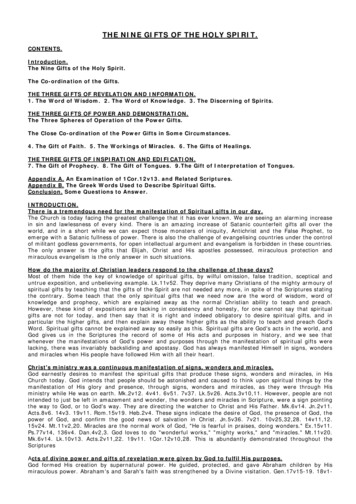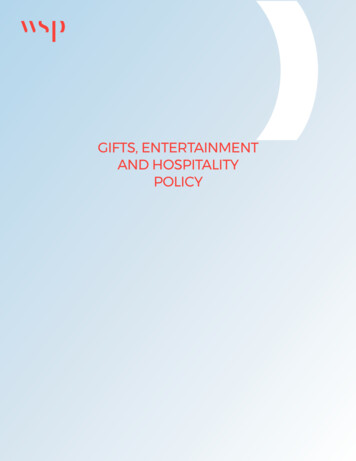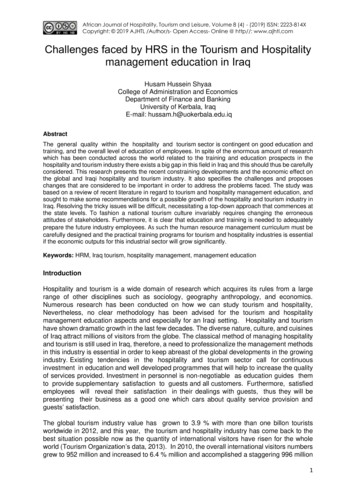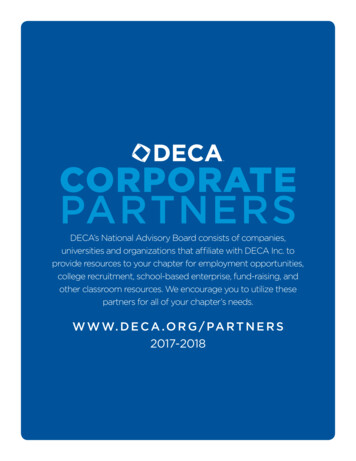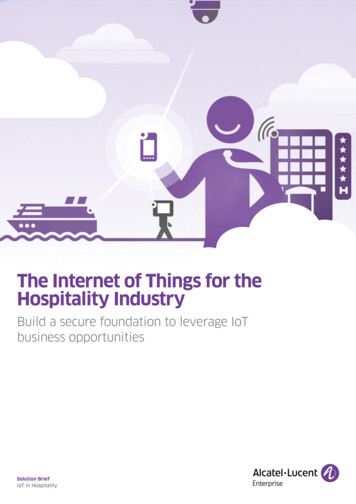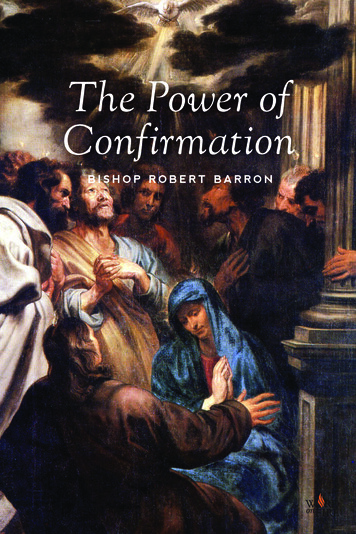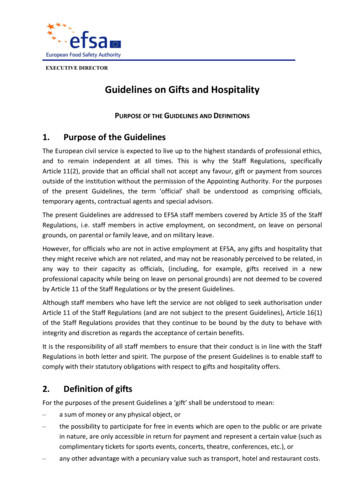
Transcription
EXECUTIVE DIRECTORGuidelines on Gifts and HospitalityPURPOSE OF THE GUIDELINES AND DEFINITIONS1.Purpose of the GuidelinesThe European civil service is expected to live up to the highest standards of professional ethics,and to remain independent at all times. This is why the Staff Regulations, specificallyArticle 11(2), provide that an official shall not accept any favour, gift or payment from sourcesoutside of the institution without the permission of the Appointing Authority. For the purposesof the present Guidelines, the term ‘official’ shall be understood as comprising officials,temporary agents, contractual agents and special advisors.The present Guidelines are addressed to EFSA staff members covered by Article 35 of the StaffRegulations, i.e. staff members in active employment, on secondment, on leave on personalgrounds, on parental or family leave, and on military leave.However, for officials who are not in active employment at EFSA, any gifts and hospitality thatthey might receive which are not related, and may not be reasonably perceived to be related, inany way to their capacity as officials, (including, for example, gifts received in a newprofessional capacity while being on leave on personal grounds) are not deemed to be coveredby Article 11 of the Staff Regulations or by the present Guidelines.Although staff members who have left the service are not obliged to seek authorisation underArticle 11 of the Staff Regulations (and are not subject to the present Guidelines), Article 16(1)of the Staff Regulations provides that they continue to be bound by the duty to behave withintegrity and discretion as regards the acceptance of certain benefits.It is the responsibility of all staff members to ensure that their conduct is in line with the StaffRegulations in both letter and spirit. The purpose of the present Guidelines is to enable staff tocomply with their statutory obligations with respect to gifts and hospitality offers.2.Definition of giftsFor the purposes of the present Guidelines a ‘gift’ shall be understood to mean:–a sum of money or any physical object, or–the possibility to participate for free in events which are open to the public or are privatein nature, are only accessible in return for payment and represent a certain value (such ascomplimentary tickets for sports events, concerts, theatre, conferences, etc.), or–any other advantage with a pecuniary value such as transport, hotel and restaurant costs.
Low value items given for purely information purposes (brochures, booklets, catalogues ) arenot considered as gifts in this context.Indirect gifts are those which are not offered directly to staff members, but to a third party thatis close to the staff member.Gifts that are offered to the agency as such in terms of Article 20 of the Financial Regulation ofthe European Food Safety Authority of 28 January 2009 are not covered by the presentGuidelines.3.Definition of hospitalityArticle 11 of the Staff Regulations furthermore refers to favours. The present Guidelines dealwith hospitality offers, which are considered to be one particular type of favour. In this context,‘hospitality’ shall be understood to mean an offer of food, drink, accommodation and/orentertainment from any source outside EFSA.PRINCIPLES4.General considerationsIt should be stressed that as a general rule, staff members should not accept any direct orindirect gifts or hospitality offered by third parties.This is most evident where gifts are offered by persons, authorities or organisations which areinvolved in or are seeking official action by EFSA or linked EU bodies or institutions especially ina sensitive area in which the staff member is, has been or will likely be active in the foreseeablefuture. All such gifts should be in principle refused. In addition, the rules apply to ‘indirect’ giftsor hospitality offered to a third party that is close to the staff member. In any event, anysituation where the acceptance of a gift or hospitality may lead to real, potential or perceivedconflict of interest should be absolutely avoided. Any gifts entailing a sum of money, regardlessof the amount, must always be refused.Acceptance of gifts or hospitality may, exceptionally be authorised (within the limits indicatedbelow under point 6, ‘Specific provisions related to Gifts’) when it is clear that this will notcompromise or reasonably be perceived to compromise the staff member's objectivity andindependence and will not damage the public image of EFSA. This evaluation can only be basedin the first place on sound judgement from the staff member in the given circumstances, andthen should be confirmed by the Appointing Authority in the relevant cases.2
5.Relevant criteriaCriteria to be considered in this context are, in particular, if the acceptance of the gift orhospitality is counter to the interest of the service or presents a real or perceived conflict ofinterests for the staff member concerned, or if such acceptance would be in accordance withdiplomatic and courtesy usage.In this respect, certain factors may point towards the likelihood that authorisation could begranted, for instance when the offer of a gift or hospitality has a low value or is addressed to alarge number of persons. On the other hand, there are factors which may point towards thelikelihood that authorisation would be refused, for instance when the offer of a gift orhospitality has a high value or, is addressed to a single staff member.In general terms, for the purposes of the assessment of a given request, the following factorscould be relevant – it being understood that the factors mentioned are not exhaustive, and thatthey will be neither individually nor collectively decisive but form part of a case-by-caseanalysis:–depending on the context, the nature of the source offering the gift or hospitality(private/public);–the apparent motive behind the offer of the gift or hospitality;–the link between the entity offering the gift or hospitality and EFSA (for exampleprocurement procedures, cases under investigation, financial interests in a special EUpolicy, etc.);–the nature and estimated value of the gift or hospitality, including whether there havebeen one or several offers from the same source;–the individual or collective destination of the offer;–the functions of the staff member;–the benefits for the service expected from the participation of the staff member at theevent in question.Gifts and hospitality motivated solely by a family relationship or personal friendship, or in acontext not related in any way to the staff member's duties do not, in principle, fall under theprovisions of Article 11 of the Staff Regulations. However, even here situations may arise whenacceptance can be perceived as compromising the staff member's independence.3
SPECIFIC PROVISIONS6.Specific provisions related to giftsIn the first place staff members should always remember that as a general rule they should notaccept any gifts and that they should make use of sound judgement in order to assess, in thegiven circumstances, if acceptance could be envisaged.Subject to the general principles set out in points 1, 2, 4 and 5 above, gifts should thereforeonly be accepted if in line with or if required by social, courtesy or diplomatic usage. In thatcase, the following administrative arrangements apply:(1)Prior permission by the Appointing Authority is presumed to be granted, in accordancewith Article 11 of the Staff Regulations and in the interest of expedient administrativeprocedures for a gift worth up to EUR 50.In this respect it is important to stress that this threshold does not mean that any staff membermay consider himself or herself at liberty to accumulate a number of gifts below the set value,bearing in mind that an accumulation may be seen to compromise the staff member'sobjectivity and independence, or may damage EFSA’s public image.(2)Explicit prior permission by the Appointing Authority is required for a gift worth betweenEUR 50 and EUR 150.If the Appointing Authority authorises acceptance, the gift may be kept. Again, it is stressedthat this threshold does not mean that any staff member may consider himself or herself atliberty to accumulate a number of gifts – which will also be an element that will be taken intoconsideration by the Appointing Authority.(3)Authorisation for gifts with a higher than EUR 150 value will be refused by theAppointing Authority.Such gifts must thus be refused. For the sake of transparency, the staff member should informthe immediate hierarchical superior, preferably in written form, that the gift or sum of moneyhas been offered and refused.Offers of any sum of money must always be refused by the staff member.(4)General considerations.In general terms, the following applies:If the Appointing Authority refuses to authorise acceptance or if a gift is unwanted, itcan be returned to the source, if this is feasible.Alternatively it can be further handled by the CORSER Unit of the Authority. The giftstransmitted by the staff members based in any location, are donated by theCORSER Unit of the Authority to an appropriate charitable organisation.4
As far as gifts returned to the source or further handled the CORSER Unit of theAuthority are concerned, such action shall not be considered as ‘acceptance’ in themeaning of the Staff Regulations, provided that the staff member immediately informshis/her immediate hierarchical superior.As a courtesy, the staff member should inform the sender, unless this would bediplomatically inappropriate, that the gift cannot be accepted and will be transmitted tocharity.Where the staff member is in doubt as to whether the refusal of a gift would be contraryto social, courtesy or diplomatic usage or might create otherwise embarrassingsituations, he/she should bring the matter to the attention of the Appointing Authoritythat on advice by the EFSA Ethics Advisor will decide on a possible refusal.Finally, the value amounts mentioned above should be estimated in good faith.7.Specific provisions related to hospitality(a)Hospitality in generalIn the first place staff members should always remember that they should not accept anyhospitality as a general rule and should make use of sound judgement in order to assess, in thegiven circumstances, if acceptance could be envisaged.Subject to the general principles set out in points 1, 3, 4 and 5 above, hospitality shouldtherefore only be accepted if in line with or if required by social, courtesy or diplomatic usage.In that case, the following administrative arrangements apply:(1)Prior permission by the Appointing Authority is presumed to be granted, in accordancewith Article 11 of the Staff Regulations and in the interest of expedient administrativepractice:of hospitality in the form of lunches or dinners strictly linked to the function ofthe official, and as such not prejudicial to the interests and public image of EFSA,and in which the official participates in agreement with his hierarchy and in theinterest of the service;of occasional offers of simple meals, refreshments, snacks etc.Even if such hospitality offers can be accepted without prior formal authorisation, in theinterest of transparency and in the interest of the person concerned, EFSA staff members shallinform their line manager immediately in writing/by e-mail of the acceptance of an offer.As in the case of gifts, it is important to stress that this presumption of authorisation does notmean that any staff member may consider himself or herself at liberty to accumulate a numberof hospitality offers, bearing in mind that an accumulation may be seen to compromise the staffmember’s objectivity and independence, or may damage the public image of EFSA.(2)Explicit prior permission by the Appointing Authority is required:As a general rule staff members should keep in mind that there is no such a thing as a freelunch. In cases not covered by the previous heading, or if the staff member judges that there isa doubt as to the appropriateness of accepting or refusing a hospitality offer, prior5
authorisation should be received from the Appointing Authority. If prior authorisation is notfeasible, the agreement by the Appointing Authority should be sought as soon as possiblesubsequent to the event. In any event the official’s line manager shall be informed.Again, it is stressed that that this does not mean that any staff member may consider himself orherself at liberty to accumulate a number of hospitality offers – which will also be an elementthat will be taken into consideration by the Appointing Authority.In any case of doubt, staff members are strongly invited to consult their line managementand/or the EFSA Ethics Advisor.(b)Hospitality offered during missionsThe mission order will as a rule cover all predictable offers of hospitality, based on the missionprogramme – notably meals, accommodation and transport. These will not be considered ashospitality offers if the programme of the mission and the participation of the official has beenauthorised – as they form part of the performance of his duties in the interest of the service.The acceptance of these offers will then be declared in the mission expense statement.Particular prudence is necessary in sensitive situations. For instance staff members participatingin inspections and similar missions should whenever possible inform their immediate superioror team leader on an ad-hoc basis, and in accordance with any other specific provisions, whenhospitality is offered in the course of such missions. If this is impossible, they should exercisetheir individual judgement and act according to the principles set out in the present Guidelines.Any hospitality thus accepted shall be declared in the mission expense statementIn this respect, in addition to the general approach as defined in points 1 and 2 above, practicaladvice on what can be considered as usual and acceptable practice in view of avoiding real orperceived potential conflicts of interest will be provided by the EFSA Ethics Advisor.8.EnforcementStaff members are reminded that infringements of Article 11 of the Staff Regulations exposethem to the risk of disciplinary action on the basis of Article 86 and Annex IX of the StaffRegulations.9.RevisionThe practical application and effectiveness of the present Guidelines on Gifts and Hospitalitywill be evaluated in reasonable time following its adoption. In the light of this evaluation, theseGuidelines may be revised as appropriate.Done at Parma, 04/07/2012[SIGNED]Catherine Geslain-LanéelleExecutive Director6
Guidelines. 3. Definition of hospitality Article 11 of the Staff Regulations furthermore refers to favours. The present Guidelines deal with hospitality offers, which are considered to be one particular type of favour. In this context, 'hospitality' shall be understood to mean an offer of food, drink, accommodation and/or
